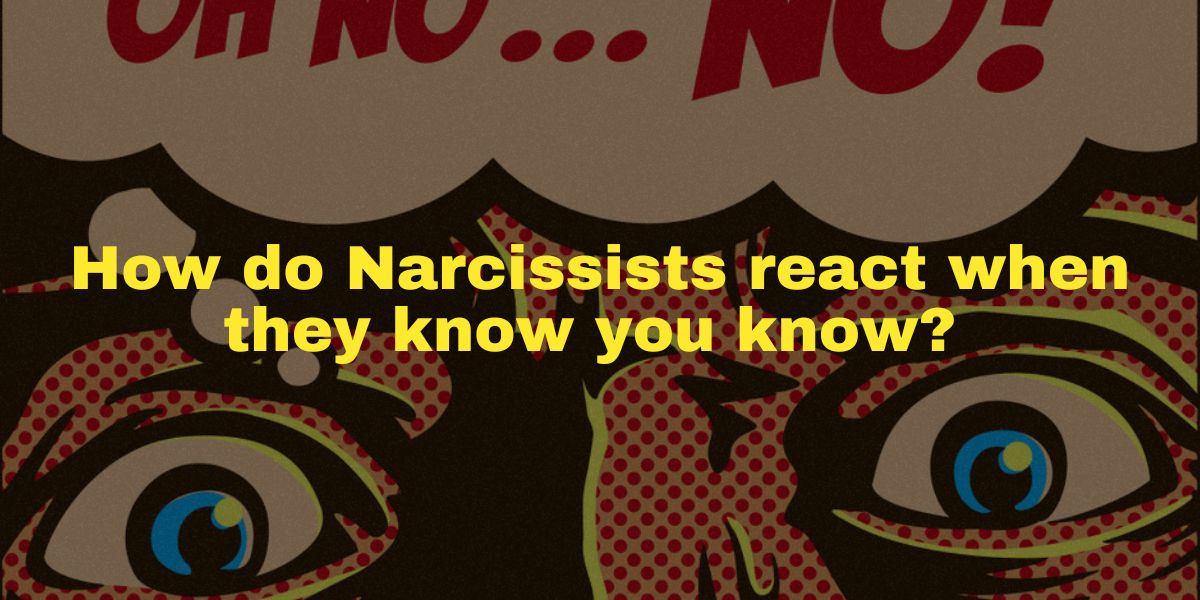Narcissists are experts at hiding their true faces and unveiling that face to the public might be the worst nightmare they could possibly expect. But, when the narcissist knows you know about them, these 11 reactions listed in this article may burst out of them.
Narcissists are often secretive in nature, as they seek to maintain control over the perception of themselves and their actions. They keep their true selves hidden and only reveal certain aspects of themselves to others. Narcissists also have a tendency to hide their true feelings and intentions, in order to manipulate and control others.
Why narcissists are secretive?
People with narcissistic traits often tend to have affairs, relationships or financial dealings that they keep hidden from others. To avoid getting caught, narcissists keep things secret. They are most prone to lying and deceit, in order to maintain control over the situation and to prevent being exposed.
Narcissists want to present a certain image of themselves to the world, and they fear that if their true selves were exposed, they would lose power and control over others. In order to protect the image of perfection that is created by them, they lie and deceive everyone around them.
How do Narcissists react when they know you know?
Narcissists are known for their inflated sense of self-importance and their tendency to exploit others for their own gain. When a narcissist knows that you know about their behavior, they may react in a number of ways to avoid their self-esteem getting destroyed. Here are 11 potential reactions that a narcissist may have when they know that you know about their behavior:
1. Refusal and Denial
Narcissists have an inflated sense of self-importance, and they may not be able to accept the idea that they have done something wrong.
They may deny that their behavior is problematic, and try to convince you that you are mistaken or overreacting. This reaction is an attempt to avoid accountability and to maintain their image of perfection.
For example, your narcissistic partner may simply deny any of your confronts telling you that you are overreacting when you bring up incidents of them yelling or throwing things.
2. Blame-shifting and Making Reasons
Narcissists often try to avoid taking responsibility for their actions. It is easy for them to shift the blame for their behavior onto you, accusing you of causing their actions or of being too sensitive.
They may also blame external circumstances, such as work stress or financial problems, for their behavior. This reaction is an attempt to avoid accountability and maintain control over the situation.
For example, If your partner cheats, they blame you for their actions, saying that you were not paying enough attention to them and that’s why they sought affection elsewhere.
3. Gaslighting
Narcissists may use manipulation tactics to control and exploit others. One such tactic is gaslighting, where they try to make you question your own perceptions and memories. If you were not strong in their confronts, you may fall right into the gaslights and believe their claims to be true.
Denying any events that took place is an act to convince you that you imagined them, in an attempt to make you doubt yourself and your understanding of the situation. Making you Doubt yourself is one of the worst effects of gaslighting that victims always suffer.
This reaction is an attempt to maintain control over the relationship and to make it harder for you to hold them accountable for their actions.
For example, When you bring up instances of them demeaning or insulting you in front of others, a narcissist may tell you that you’re imagining things.
4. Withdrawal or Silent treatments
Since narcissists are not ready to face you as you know about them now, they try to withdraw from the relationship, either physically or emotionally, in an attempt to avoid accountability for their behavior.
They may stop communicating with you or refuse to engage in discussions about the issue. This reaction is an attempt to avoid accountability and maintain control over the relationship.
For example, Your partner may stop talking to you and refuse to engage in any conversations when you confront them about their behavior, in an attempt to avoid accountability.
5. Aggression
Narcissists may become angry and aggressive when their behavior is called into question. Aggression is mostly found in narcissists who are malignant and other types of narcissists show comparatively low aggression. Lashing out at you in an attempt to intimidate or control you, using verbal abuse, threats, or even physical violence are the parts of aggression they express when they know you know about the narcissists.
This reaction is an attempt to assert dominance and maintain control over the relationship.
For example, A narcissist with whom you have any relationship will become angry and aggressive when you confront them about their lies and may raise their voice or use threatening language to try to intimidate you into dropping the subject. It will turn into verbal abuse, bringing out the past and any irrelevant scenarios to make your point invalid.
6. Projection
When the narcissist came to know you know about them, he/she may accuse you of the exact behaviors that they are guilty of in order to divert attention away from their own acts. They may accuse you of being selfish, controlling, or manipulative in order to divert attention away from their own conduct. This reaction is an attempt to avoid accountability and retain control over the relationship.
For example, if your partner cheats and you confront them, the narcissistic partner will try to accuse you of cheating with someone else out of the blue to divert or validate their behavior.
7. Triangulation
Narcissistic Triangulation is an act of bringing a third person into a relationship to cause confusion, abuse, and control the victim. Narcissists may try to create division between you and others in your life, by spreading rumors or lies about you to others.
This will turn your friends, family, or coworkers against you. Triangulating helps the narcissist isolate you and make it harder for you to hold them accountable for their actions. This reaction is an attempt to maintain control over the relationship and to make it harder for you to leave.
For example, Your narc partner might use a mutual friend or a family member to spread lies and rumors about you, in an attempt to isolate you and make it harder for you to leave the relationship.
8. Trivializing or Normalizing
Narcissists may try to downplay the severity of their behavior, making it seem like a small or insignificant issue. They may say things like, “It’s not a big deal” or “It’s just a minor disagreement,” in an attempt to normalize their behavior toward you and the relationship. This reaction is an attempt to avoid accountability and maintain control over the relationship.
For example, When you confront them about their abusive acts, they justify their intentions and try to normalize it by responding like “These are common between relationships or families, you’re just overreacting”
9. Victim Play
When the narcissist has nowhere to go, nothing to blame, or couldn’t escape your confrontation, they play the victim card as an uno reverse card. Your partner accepts their mistake, fake apologizes, may promise to change or to seek help, in an attempt to gain your sympathy or to get you to drop the subject. This reaction is an attempt to maintain control over the relationship and to exploit you for their own gain.
For example, your partner may gain sympathy from you by saying “As I’m depressed and become emotionally unstable, I have to do this” and fake apologizing that this will never happen again while it is a regular behavior of theirs.
10. Deflection or Distraction
Narcissists may try to steer the conversation away from their own behavior and onto another topic, in an attempt to avoid accountability. They may try to change the subject, or bring up irrelevant issues, gossip, etc, in an attempt to distract you from the issue at hand. This reaction is an attempt to avoid accountability and maintain control over the conversation.
For example, When you bring up a personal issue about them, they bring up an issue from family or office to divert the conversation saying “Focus on other important issues”
11. Distort and reshape the Truth
Narcissists may try to reinterpret events in a way that makes their behavior seem more acceptable or understandable. They may twist the facts, or exaggerate certain aspects of the situation, in an attempt to justify their behavior. This reaction is an attempt to gaslight and change the whole perspective of the situation in the eyes of the victim.
For example, Your partner may admit that they had a night over with whom you suspect, but swear that he/she left as soon as watching a movie on Netflix.
How to respond when a Narcissist knows you are onto them?
If a narcissist reacts in any of the ways listed above, it’s important to remember that their behavior is not your fault and that you should not take responsibility for it. Here are some things you can do to handle a narcissist’s reactions:
- Stay calm and assertive: Narcissists may try to provoke a reaction from you, but it’s important to stay calm and assertive in your communication. Speak in a firm and clear tone, and avoid getting caught up in their emotional manipulation tactics.
- Set boundaries: It’s important to set boundaries and to not engage in their manipulative behavior. Communicate your needs and expectations clearly, and make it clear that certain behaviors will not be tolerated.
- Seek support: It’s important to seek support from friends, family, or a therapist. They can provide you with a different perspective on the situation and help you to cope with the emotional toll of dealing with a narcissist.
- Document the behavior: If you are experiencing abuse or manipulation, it’s important to document the behavior, including dates, times, and specific examples of what occurred. This documentation can be helpful if you decide to seek legal or professional help.
- Consider ending the relationship: Narcissists are not capable of change, and it may be best to end the relationship if the behavior is causing harm to yourself or others.
- Prioritize self-care: Being in a relationship with a narcissist can take a toll on your mental and emotional health, it’s important to prioritize your self-care and engage in activities that make you feel good, such as exercise, therapy, and spending time with people you care about.
- Seek professional help: Narcissistic behavior can be very difficult to deal with and it’s important to seek professional help if you are in a relationship with a narcissist. A therapist or counselor can help you to understand the dynamics of the relationship and to develop strategies for coping with the narcissist’s behavior.
Ending with a note:
It’s essential to remember that Narcissistic behavior can be tough to deal with, so take care of yourself and get help when necessary. Remember that it is not your obligation to change the narcissist and that it is okay to dissolve the relationship if it is causing you or others pain.











